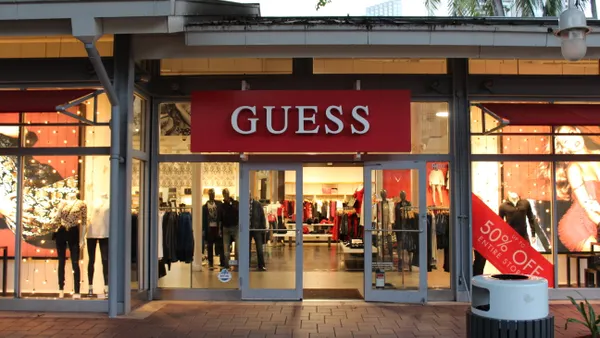Dive Brief:
-
Forever 21 is in the process of shuttering its Chinese e-commerce website, according to a notice on its home page, as reported by Women’s Wear Daily and other news outlets.
-
There are also local news reports of at least one store closing and massive discount sales that could indicate additional store closures, according to the WWD report. Forever 21 didn’t immediately respond to Retail Dive’s request for comment.
-
The news follows a March China Post report of the brand closing its last Taiwan store after shuttering a location in a shopping center there last year. The company has also shuttered a significant number of stores elsewhere in recent months, including France, according to various media reports.
Dive Insight:
Retailers from Tiffany to Walmart in recent years have set up shop in China in search of sales. The country's massive population includes a rising middle class and its economic expansion has been the envy of the world for years.
That has been slowing of late, although China's growth still beats most. Many Chinese consumers favor American and luxury brands and happily open their wallets when they travel, although that too has slowed due to the dollar's strength. That's prompted some Stateside retailers to accept Alipay in order to spare Chinese tourists the unfavorable exchange rate. Tiffany in its recent reports has insisted that, while U.S.-based sales from Chinese consumers have faltered, domestic China sales remain robust.
Still, it's becoming clear to some brands that China may not be the slam dunk they thought it was and that there are some hard truths about establishing an outpost there. Amazon recently said it is shutting down its Amazon China marketplace to focus on cross-border sales. And now Forever 21 looks to be walking away too.
"Overall this is a big and tough market to compete for non-Chinese brands, given strong domestic competition and unique consumer demands. Domestic e-commerce giants such as Alibaba, JD.com, and Pinduoduo compete fiercely against each other as well as edge out smaller brands," Xiaomeng Lu, the China practice lead at Access Partnership, a global public policy consultancy for the tech sector, told Retail Dive in an email, noting that Amazon is leaving after investing in the market for 15 years. "Chinese customers are used to shopping on apps, expect low-cost same-day shipping, and tend to have little brand loyalty."
Alibaba and JD.com alone have taken about 70% market share, according to Arianna Zhai, analyst at Euromonitor International. "The strong presence and different strategic positions of both e-commerce retailers leave limited room for others," she told Retail Dive in an email.
Plus, Chinese consumers aren't as price-conscious as they once were, she also said. "As Chinese consumers have become increasingly sophisticated, their focus has shifted from pricing concerns to a search for high-quality and reliable brands, as well as an enhanced and tailored user experience," she said. "With strong local market knowledge and data capabilities, Alibaba can quickly better identify and serve Chinese customers through personalization."
That's not a good position for Forever 21, which is laser-focused on churning out fashion trends at a rapid rate and offering some of the lowest prices in apparel.
"The reasons for the shutdown of operations are unclear, but it is likely that Forever 21 has struggled to cut through in what is an increasingly competitive market," GlobalData Retail Managing Director Neil Saunders told Retail Dive in an email. "Although the Chinese retail market is still growing strongly and offers enormous potential, the proliferation of western and indigenous brands means it can be hard to stand out from the crowd. There are also concerns that activity is slowing down, although growth remains well above that available in Western markets."
Forever 21 may have also faced the conundrum of investing in China — that it must be a bold move. But that can get very expensive, and undermine the return, according to Saunders, who said other brands may be facing the same decision. "Really, China is a market where retailers need to go big or go home. It is hard to thrive with half measures," he said. "You’ve got to commit, invest and grow rapidly to make an impression and good sales. Forever 21 always seemed fairly half-hearted about its foray into China. There was a degree of caution, which may have been prudent given the brand has failed to take off."














